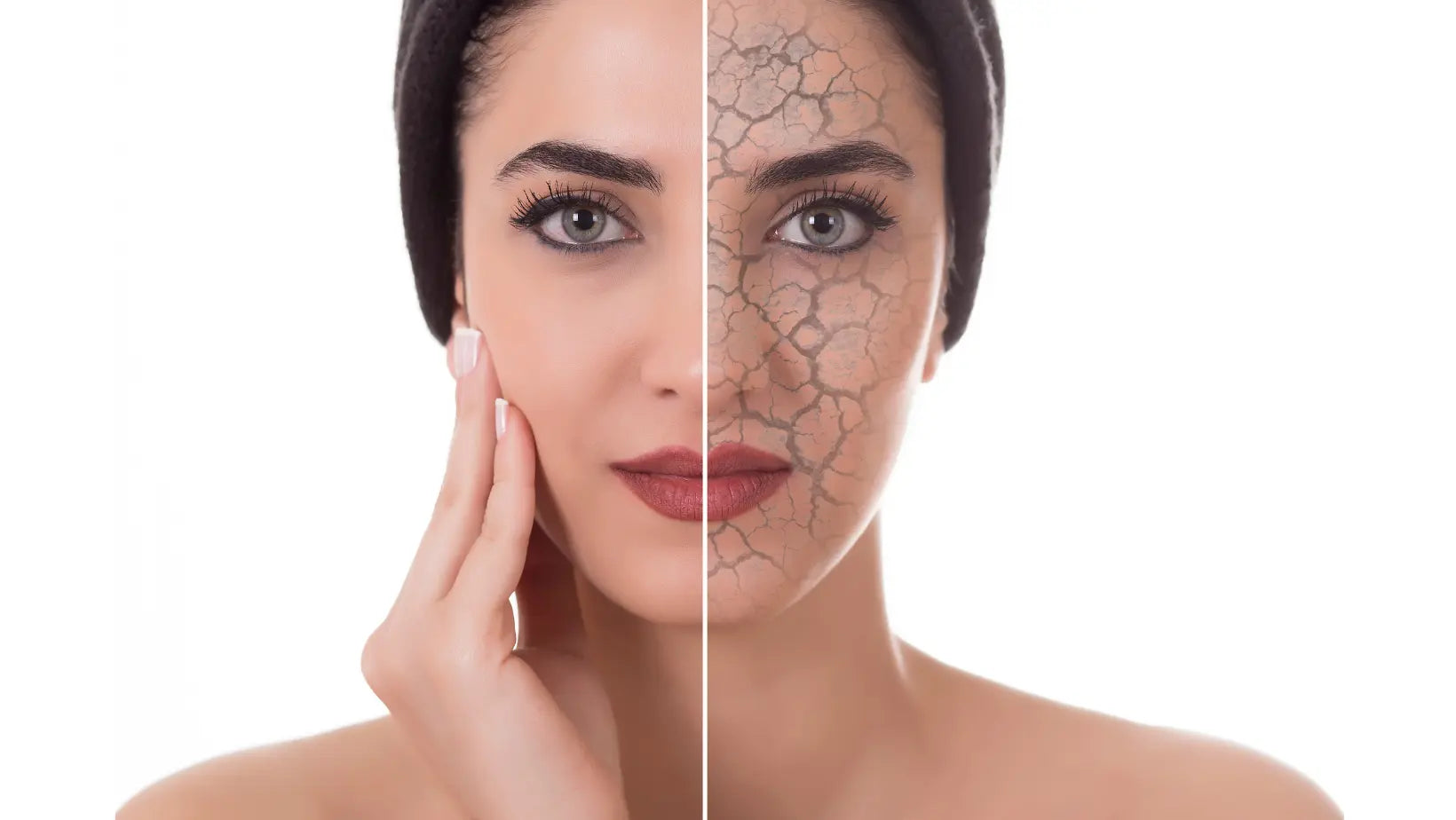
The difference between dry skin and dehydrated skin: What you need to know
In the world of skincare, the terms "dry skin" and "dehydrated skin" are often confused or used interchangeably, but they represent different realities with specific care needs. Correctly understanding the differences between these two skin conditions is not just a cosmetic curiosity, but a necessity for anyone who wants to have healthy and radiant skin. Dry skin refers to a chronic lack of sebum and is a permanent characteristic of the skin, while dehydration is a temporary condition indicating a lack of water in the layers of the epidermis. This distinction is crucial because each condition requires different treatment and specialized products to restore the skin's balance and health. Therefore, correctly and promptly recognizing each of these aspects can prevent unnecessary complications and guide the selection of care products, ensuring that your skin receives exactly what it needs to shine.
What is dry skin?
Dry skin is characterized by insufficient sebum production by the sebaceous glands, which causes the skin to be unable to retain moisture effectively. This lack of sebum leads to a weakened skin protective barrier, thus allowing faster evaporation of water and making the skin vulnerable to external irritants.
Characteristics of dry skin include:
- Roughness: The skin feels rough to the touch due to dead cells that are not effectively removed because of the lack of oils that help this process.
- Desquamation: The skin may show areas of desquamation, where dead skin cells accumulate and do not naturally shed.
- Tightening sensation: The skin may have a tightening sensation, especially after washing, due to lack of elasticity and hydration.
Potential causes of dry skin:
- Genetics: Some people are genetically predisposed to have dry skin, with less active sebaceous glands.
- Age: As we age, sebum production in the skin tends to decrease, which can lead to dryness.
- Environmental factors: Cold weather and wind can exacerbate skin dryness, as can prolonged exposure to the sun or air conditioning.
- Diet: The lack of essential nutrients, such as omega-3 fatty acids, can affect skin health.
- Use of inappropriate products: Harsh soaps and skincare products containing alcohol or fragrances can dehydrate the skin and worsen dryness.

Understanding these aspects is essential for choosing the appropriate treatments and for improving the comfort and appearance of dry skin. By selecting the right skincare products and adjusting daily habits, you can help renew and protect your skin.
What is skin dehydration?
Skin dehydration is a common condition that is not limited to a specific skin type but can affect anyone, regardless of their skin nature – whether oily, combination, normal, or dry. This emphasizes that dehydration is not about the lack of oil, but about the lack of water in the layers of the epidermis.
The difference between lack of oil and lack of water:
- Lack of oil (dry skin): It is characterized by sebaceous glands that do not produce enough sebum, which leads to skin that cannot retain moisture effectively and becomes dry and rough.
- Water deficiency (dehydration): Occurs when the skin fails to retain enough moisture, regardless of how much oil it produces. This can be caused by external factors such as dry environments, excessive sun exposure, air conditioning or heating, as well as internal factors like insufficient hydration or diet.
Dehydration can affect any skin type:
Dehydrated skin is not exclusive to dry skin; in fact, even oily skin can be dehydrated if it is not properly hydrated. This can cause the skin to compensate by producing excess sebum, which can lead to a vicious cycle of imbalances and skin problems, including acne.
Symptoms of dehydration:
- Dull skin: Lack of proper hydration causes the skin to lose its brightness and appear more dull.
- Apparent fine wrinkles: When the skin is dehydrated, fine lines and wrinkles become more visible because the skin does not have enough moisture to stay plump and smooth.
- Lack of elasticity: Dehydrated skin can lose elasticity, becoming less supple to the touch, which is demonstrated by the simple "pinch" test, where the skin slowly returns to its original shape after being gently pinched between the fingers.

Recognition and treatment of dehydration are essential for restoring the skin's water balance. The use of products with ingredients that help retain water, such as hyaluronic acid, can have a significant impact on alleviating this condition and maintaining the overall health of the skin.
How do you differentiate dry skin from dehydrated skin?
To quickly and efficiently determine your skin type, I recommend using the Paper Towel Test. Start by cleansing your face to remove impurities and makeup, then wait an hour without applying any other products. After that, press a paper towel on different areas of your face, such as the forehead, nose, cheeks, and chin. Look at the towel after use: if it shows oil spots, especially in the T-zone, you have oily skin; no oil marks, dry skin; a little oil only in the T-zone, normal skin; and oil in the T-zone but clean on the cheeks, combination skin. After identifying your skin type, if your skin feels dry, rough, dull, and lackluster, it might be dehydration. This simple test will clarify your skin type and help you choose the most suitable skincare products.
The role of hyaluronic acid in skin hydration
Hyaluronic acid is a powerful humectant, which means it has the ability to attract and retain moisture in the skin, being an essential ingredient in cosmetic products intended for hydration. Naturally present in the human body, most of the hyaluronic acid is found in the skin, where it helps maintain hydration and elasticity.

Benefits of hyaluronic acid:
- Water attraction: Hyaluronic acid can bind up to 1000 times its weight in water, making it extremely effective in attracting moisture from the environment and from the deeper layers of the skin to the outer layers. This is a crucial property for dehydrated skin, which suffers from a lack of effective moisture.
- Water retention: Through its ability to form a barrier on the skin's surface, hyaluronic acid helps retain water, thus preventing transepidermal water loss (TEWL). This is essential for maintaining proper hydration, thereby improving the texture and appearance of the skin.
- Anti-aging benefits: Since hydrated skin is less prone to the formation of wrinkles and fine lines, hyaluronic acid contributes to the youthful and healthy appearance of the skin. Effective hydration can visibly reduce the appearance of existing wrinkles and slow the formation of new ones.
- Suitable for all skin types: Being extremely gentle, hyaluronic acid is suitable for all skin types, including sensitive and acne-prone skin, as it does not clog pores or cause irritation.
Royal Rich Range with hyaluronic acid

For those interested in the benefits of hyaluronic acid, the Royal Rich range offers a variety of products enriched with this miraculous ingredient. From serums to face creams, these products are formulated to maximize the moisturizing and rejuvenating effects of hyaluronic acid. Regular use of these products can help transform dry and dehydrated skin into visibly healthier and more radiant skin, while simultaneously reducing visible signs of aging and providing a feeling of comfort and softness throughout the day.
In conclusion, recognizing and understanding the differences between dry skin and dehydrated skin are essential for developing an effective skincare routine that adequately addresses the specific needs of your skin. Whether you are dealing with the insufficient sebum production characteristic of dry skin, or struggling with moisture loss in dehydrated skin, the correct selection of skincare products can make a significant difference.
Hyaluronic acid, with its exceptional abilities to attract and retain moisture, plays a crucial role in maintaining optimal hydration and combating signs of aging. Products from the Royal Rich range, enriched with hyaluronic acid, offer an excellent solution for revitalizing and rehydrating the skin, ensuring that every day is a step towards healthier and more radiant skin. By adopting an informed and careful approach to skincare, you can achieve not only visibly improved complexion but also increased confidence in your own beauty ritual.



Leave a comment
This site is protected by hCaptcha and the hCaptcha Privacy Policy and Terms of Service apply.